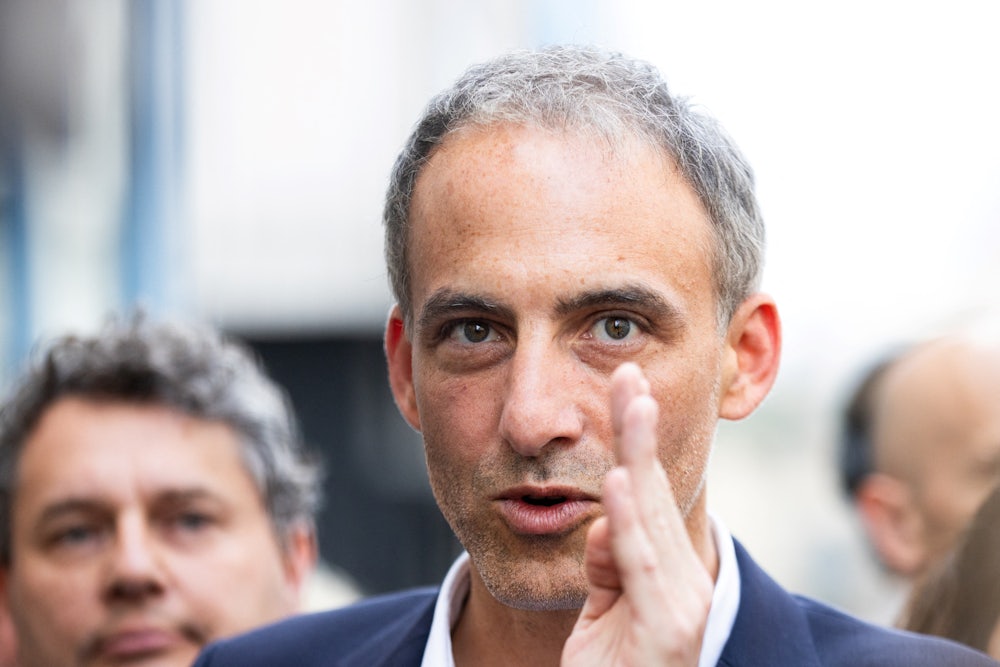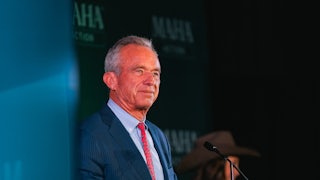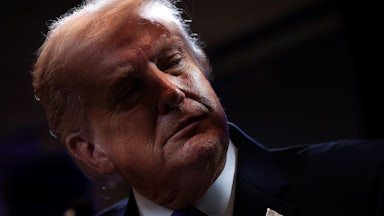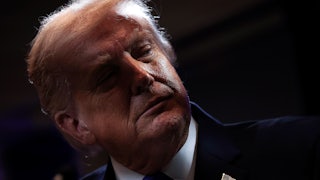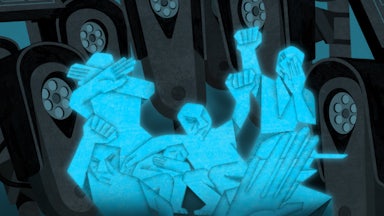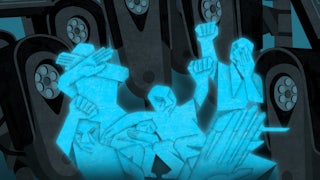This week, French President Emmanuel Macron returns to the mundane task of forming a government as he gathers all of the parties together to hash out a compromise to replace his caretaker government. He had postponed this task to preside over the Olympics, and now that it is upon him, it will no doubt be a difficult set of negotiations, since no party has a majority in the new parliament, not to mention that his own party had a dismal showing.
After his rash decision to hold national elections at the end of June, he was flatly rejected in third place while Marine Le Pen’s far-right party soared to victory in the first round of voting. A united left coalition led after the second runoff round, but this result didn’t please Macron, who is reluctant, to say the least, to form a government with the left as the majority party and his centrist party as a junior addition.
It was an extraordinary feat when a disparate set of left-wing parties united under the banner of the New Popular Front to stop what could have been a victorious fascist right. These left parties differ on everything from how to run the economy to Russia’s war against Ukraine to Israel and Hamas, but they united around the need to ensure that Le Pen doesn’t take charge of the French Republic.
Many figures on the French left played important roles in the victory, such as new star Marine Tondelier, who heads the Green Party. But it’s safe to say that, without Raphael Glucksmann, Le Pen could have soared to victory. His popularity lent support to what would have otherwise been a hard-left formation that could not have brought the number of votes needed to impact the broader electorate.
Glucksmann was a journalist and filmmaker focusing on human rights before his foray into politics. In 2018, he founded Place Publique, a new socialist movement that did surprisingly well in the recent European Union parliamentary elections in early June when it joined alongside the Socialist Party list, running almost equal to Macron’s own party. Glucksmann doubled his numbers from the 2019 European Union elections, when he made his first run for office.
Macron, according to Le Monde, told his team to treat Glucksmann “with a touch of condescension” and to act as if “he doesn’t exist.” But it turns out that he has found himself a worthy opponent instead in Glucksmann, who represents a new strain of social democracy in Europe—like newly elected British Prime Minister Keir Starmer—that is organizing to fight simultaneously against the authoritarian left, the fascist right, and a muddy middle.
I interviewed Glucksmann in late July about why he blessed unity on the left and about his own vision.
“In politics, you have to identify the main danger and then decide the best way to act against this danger,” he told me. “This is why we supported the creation of the Popular Front, but with a clear understanding of our red lines.” Among those, support for Ukraine against Russia is key, along with “no support of attacks by terrorists and for the fight against antisemitism, and the fight against the brutalization of public debate.”
Glucksmann comes from a politically engaged intellectual milieu. His father was the prominent politically active philosopher and leftist anti-Communist André Glucksmann, part of a group known as the New Philosophers, who broke from Marxist ideology in the 1970s. Among that group was Bernard-Henri Lévy, who this year, even with the clear lines that Glucksmann delineated, took Glucksmann to task publicly for this left unity because Glucksmann joined with Jean-Luc Mélenchon, head of the more authoritarian left La France Insoumise. Glucksmann defended himself forcefully to me: “We were in the situation in which the president decided [on] the dissolution [of the government] without any form of reason, and he was opening the gates of power to the far right.… You have to evaluate the main danger you are facing. Is it [the] populistic left or is it the far right?… I think that one of the main duties you have in life is to establish a hierarchy of perils.”
He continued: “I never considered the New Popular Front as a general project for [the] transformation of society.… [I]t’s a defensive alliance for unity of action against the far right.… [T]he position of moral equivalence between populistic left and far right for me is not moral. It’s a negation of what’s the main danger.” That, he said, is “not the populistic left, and it’s not woke ideology. It’s Trumpism. It’s Le Penism, and it’s the far-right triumph.”
At the same time, Glucksmann is stark about his sentiments regarding both Macron and Mélenchon. Both, he says, “have a common understanding that they need each other to suffocate social democracy. And what we have to do is just pull them back where they should belong. Mélenchon should be in the margin of politics, and Macron should be in the right where he belongs, and we should have a space. But for that to happen, you need to have a strong voice between them and show to them that you are not afraid of them or that you are not fascinated by them.”
Israel, in France as in the United States, constitutes a dividing line. Glucksmann, who is Jewish, came out immediately against Hamas last October and has refused to use the word “genocide” in response to Israel’s war against Hamas, putting him at odds with some in his alliance. However, he is of course no fan of the current Israeli government or of its conduct during the war in Gaza. Mélenchon has harshly attacked Israel, and he and his supporters are considered antisemitic by many in the Jewish community, including on the left. Mélenchon even denounced a massive nonpartisan rally that was held in Paris against antisemitism. (The Socialist Party in France, on the other hand, has a history of engaging in bilateral peace efforts between Israelis and Palestinians.) Then, on May Day, at a rally of the united left, Glucksmann was targeted with violence by Mélenchon supporters who threw red paint at him, yelled vindictively, and forced him to leave the event. He later posted on X that “These attacks are the result of months of hatred and slander cleverly orchestrated by [La France Insoumise] and others,” linking the attacks to Mélenchon. Glucksmann, undeterred, told me that “it’s obvious to people that Hamas attacks are terrorist. It’s clear, and it’s just a segment of our left that challenges that,” he said.
Glucksmann is forging ahead with his long-term vision. He wants to combine a more traditional social democratic ideology with a “new ecological preoccupation.” He is critical of the former socialist governments, the most recent of which was led by President François Hollande from 2012 to 2017. Hollande’s presidency was mired with personal scandals centered around his romantic life that were a bit too much of a diversion from governing for even the French public to absorb. The former president represented an elite quality that made him appear separated from the people, and he directed an economic policy that was neoliberal—or what Glucksmann calls “democratic capitalism”—and not socialist. In fact, Macron was minister of economics, industry, and digital affairs under Hollande and deputy secretary-general to the president before that. He broke away from the Socialist Party, taking with him more than enough parliamentarians to help topple a party that was already teetering due to a confusion of vision. More recently, Paris Mayor Anne Hidalgo ran for president under the Socialist flag in 2022, receiving just over 1 percent of the vote.
This recent history is very much on Glucksmann’s mind as he builds his influence. “Since the European election and during the legislative campaign, we have grown 10 times,” he said. “We have to build our own forces and go on growing. Because I’m convinced that’s what people actually want. So what we will do is we will keep growing, keep our free speech, which means that when we have to criticize the left, we will do it very strongly and without any form of fear of what can be the accusation of treachery or divisionism or whatever bullshit they are using as tactics.”
There are three prongs to Glucksmann’s vision: a vibrant social economic plan that impacts people where they live, an approach to a future that supports a positive approach to the climate, and a defense philosophy that sustains a free Europe.
On domestic politics, Glucksmann sees President Biden’s Inflation Reduction Act as a model for action, because it addresses a lot of core concerns for the left, combining job creation with attention to our battered earth. “The green revolution doesn’t mean less factories. It means more factories in Europe,” he explains. That’s why he spent a lot of his own campaign in the French countryside. “I wanted to go where this green revolution will happen. It will not happen in my neighborhood, having tea with my friends and discussing how great the world would be when we won’t have cars anymore. It will happen in factories and in farms.” A look at the French electoral map confirms this strategy. Paris is a nearly solid block of left-wing voters, but the countryside and smaller towns need attention to veer them away from Le Pen with policies that address their anger with concrete action.
The rise of the far right throughout Europe, including in France, is largely tied to job loss, which created a backlash against massive, green-centered policies. But Glucksmann has an answer to this: “Everywhere I went in France, I had the same remarks and frustration from people. When you go out from big cities that are voting for us, it’s always the same thing. We don’t know where our country is going. The impression of losing control over our own destiny. We have to showcase that this green revolution is a way of taking back control. It’s not only fighting climate change. It’s a way of bringing back jobs, bringing back industries, bringing back control over our destiny, bringing back sovereignty of politics.”
Meanwhile, Glucksmann is profoundly aware of the danger of right-wing rule in the United States. “Obviously, if you have a Trump presidency, it’s a nightmare for Europe,” he conveys. Trump’s ties to Russia and his disdain for intervention to save Ukraine’s independence is a “life or death war for Europe,” he warns, since Glucksmann believes that Putin’s aim is to attack “European security architecture,” not simply to dominate Ukraine.
That’s also why he believes that the left in Europe must build its own defense capacity. He describes his concern graphically: “You cannot have a sleepless night every four years looking at elections in counties you have never heard of. You don’t know why people are voting for this or that camp in this county in Florida or in Michigan. And your fate is decided by these people. This is not normal.”
But, of course, that “doesn’t mean you don’t need the transatlantic alliance,” he emphasizes, explaining that there must be two pillars—the United States and Europe—both able to defend themselves and to decide for themselves. “It will help the U.S. and it will help us if we are able to decide by ourselves.… [T]he U.S. will have an ally in Europe, not a dependent burden.”
While Glucksmann will not be in the new government (he continues to serve as the leader of the Socialist list in the European Parliament), his influence is great. This election was the beginning of rebuilding a socialist left in France that can govern, and there are hopes in France that as this new left grows, so too will Glucksmann’s stature as a future leader not only of the camp but for political leadership inside France. So far, he has shown no missteps on his short and steady climb.
In the midst of a high-stakes election campaign here in the U.S., it’s difficult not to hear our own plight in Glucksmann’s words. Harkening back to Athens, the birthplace of democracy, he stresses that everyone must feel engaged. “I’m also hopeful that when we are confronted with the potential collapse of democracy, this will oblige us to consider it not as a structural and formal thing, but as a living body that you have to cultivate and defend.”
